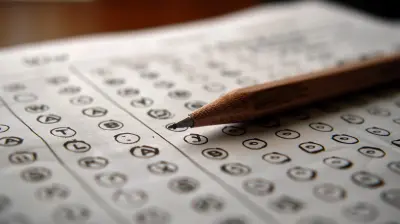The Influence of Stereotype Threat on Student Performance
16 March 2025
When you step into the classroom, you might think that a student’s success is all about how hard they work or how smart they are. But what if I told you there’s something lurking beneath the surface that can mess with their performance—without them even realizing it? It’s called stereotype threat, and it’s a psychological phenomenon that can have a serious impact on how students perform, especially during high-stress situations like exams or presentations.
In this article, we’re going to dive deep into the concept of stereotype threat, explore how it affects students, and—most importantly—what we can do about it. So sit tight, because understanding this could change the way we think about education and student success.

What Is Stereotype Threat?
Let’s start with the basics. Stereotype threat is a psychological concept that refers to the fear or anxiety people experience when they are at risk of confirming negative stereotypes about their social group. In the context of education, this could be related to gender, race, socioeconomic status, or even perceived intelligence.For example, there's a stereotype that women aren’t as good at math as men. When a female student walks into a math test, the mere awareness of this stereotype can trigger anxiety. This anxiety doesn’t just make her feel uncomfortable; it can actually lower her performance—even if she’s fully capable of acing the test.
It’s important to note that stereotype threat isn’t limited to women or any one particular group. It can affect anyone who belongs to a group that’s subject to a negative stereotype. Whether it’s African American students being stereotyped as underperforming in academics, or students from lower-income families feeling like they don’t belong in elite institutions, stereotype threat can rear its ugly head in a variety of situations.
The Science Behind Stereotype Threat
So, how does this work? Psychologists Claude Steele and Joshua Aronson were the first to study stereotype threat in the 1990s. They found that when students were reminded of their social group’s stereotype right before a test, their performance dropped. This happened even when the students had the same level of ability as their peers.Here’s the kicker: the pressure to not confirm a negative stereotype can lead to stress, which in turn affects cognitive functions like memory and concentration. Imagine trying to solve a complex math problem while your brain is busy worrying about not living up to a stereotype—it’s like trying to run a race with a weight tied to your ankle.
The Role of Cognitive Load
Let’s break it down further. Cognitive load refers to the amount of mental effort we’re using at any given time. When we’re under stereotype threat, a part of our brain is occupied with managing the stress and anxiety of possibly confirming a negative stereotype. This means less brainpower available for the actual task at hand—whether that’s solving math problems, writing an essay, or even answering simple questions in class.It’s like trying to juggle while riding a bike. You’re so focused on keeping the balls in the air (in this case, managing your anxiety) that you start wobbling on the bike (i.e., your performance suffers).

How Stereotype Threat Affects Different Groups
Stereotype threat isn’t a one-size-fits-all phenomenon. Different groups experience it in different ways, and the impact can vary depending on the context. Let’s take a closer look at how stereotype threat works with some specific groups in educational settings.Gender and Stereotype Threat
One of the most studied areas of stereotype threat is gender, particularly in fields like math, science, and engineering. There’s a persistent stereotype that men are naturally better at these subjects than women. When female students are reminded of this stereotype—whether subtly or explicitly—they tend to underperform compared to their male counterparts, even when they have the same level of ability.Here’s an interesting tidbit: studies have shown that when the math test is presented as “gender-neutral” and students are told that men and women typically perform equally well, the performance gap disappears. This suggests that it’s not the actual ability that’s the issue; it’s the weight of the stereotype.
Race and Stereotype Threat
African American and Hispanic students often face stereotypes related to academic ability. The stereotype that these groups are “less intelligent” or “don’t work as hard” can significantly affect performance, especially in high-stakes environments like standardized testing.One study showed that African American students performed worse on a test when they were asked to identify their race beforehand. This simple act triggered anxiety about confirming the stereotype, leading to lower scores. But when the test was framed as an intelligence-neutral task, the performance gap between African American and white students closed significantly.
Socioeconomic Status and Stereotype Threat
Students from lower-income backgrounds can also experience stereotype threat, especially when attending elite schools or universities. The stereotype that they are “less cultured” or “less capable” compared to their wealthier peers can create a sense of not belonging, which can impact both academic performance and mental health.In fact, the fear of being judged based on socioeconomic status can lead to students withdrawing from opportunities, such as joining clubs or taking leadership roles, further limiting their academic and social growth.

Real-World Examples of Stereotype Threat
Stereotype threat isn’t just some abstract psychological theory; it plays out in real-world scenarios every day. Let’s take a look at a few situations where stereotype threat can have a tangible impact on student performance.College Entrance Exams
Standardized tests like the SAT or ACT are prime breeding grounds for stereotype threat. Students from marginalized groups—whether due to race, gender, or socioeconomic status—often walk into these exams knowing that their performance might be scrutinized through the lens of a stereotype.This added pressure can lead to lower scores, which in turn affects college admissions and scholarship opportunities. It’s a vicious cycle: the stereotype affects performance, which then reinforces the stereotype.
Class Participation
Stereotype threat doesn’t just affect test scores—it can also influence how comfortable students feel participating in class. For example, a female student in a male-dominated engineering course might hesitate to ask questions or contribute to discussions, fearing that she’ll be seen as confirming the stereotype that women aren’t as capable in STEM fields.Similarly, students from minority racial or ethnic groups may feel reluctant to speak up in class if they think their peers or teachers hold negative stereotypes about their intelligence or work ethic.
Group Work and Collaboration
Group projects can also be a source of stereotype threat. Imagine being the only student of color or the only woman in a group. You might feel like you’re representing your entire social group, and the pressure to not confirm any negative stereotypes can be overwhelming. This can lead to either withdrawing from the group or overcompensating, both of which can hinder collaboration and learning.
Combating Stereotype Threat: What Can Be Done?
Now that we understand how stereotype threat works, the next question is: what can we do about it? Fortunately, there are several strategies that educators, students, and even institutions can use to mitigate the effects of stereotype threat.1. Reframe the Task
One of the most effective ways to reduce stereotype threat is to change the way tasks are presented. As we saw earlier, simply framing a math test as “gender-neutral” can eliminate the performance gap between male and female students. Similarly, tests can be introduced as measures of learning rather than a reflection of innate intelligence, which can reduce the pressure students feel to “prove” themselves.2. Encourage a Growth Mindset
A growth mindset—the belief that abilities can be developed through effort and learning—can help counteract stereotype threat. When students believe that intelligence isn’t fixed and that they have the power to improve, they’re less likely to be derailed by negative stereotypes.Teachers can promote this mindset by praising effort rather than ability and by emphasizing that mistakes are a natural part of the learning process.
3. Build a Sense of Belonging
Creating an inclusive classroom environment where all students feel like they belong is crucial for combating stereotype threat. This can be as simple as incorporating diverse perspectives into the curriculum, fostering open discussions about stereotypes, and actively working to challenge biases in the classroom.Mentorship programs can also be helpful, particularly for students from underrepresented groups. Seeing someone who looks like them succeed in a particular field can boost confidence and reduce the anxiety of stereotype threat.
4. Reduce the Salience of Stereotypes
Another strategy is to reduce the salience—or visibility—of stereotypes. This can be done by avoiding questions or prompts that remind students of their social group before a test or assignment. For example, asking students to indicate their gender or race on a test form can trigger stereotype threat, so avoiding these questions can help students focus purely on the task at hand.Final Thoughts: Stereotype Threat and the Future of Education
Understanding stereotype threat is crucial if we want to create a more equitable educational system. This invisible barrier can hold students back, not because they lack ability, but because they’re carrying the weight of societal expectations and prejudices. By recognizing and addressing stereotype threat, we can help all students reach their full potential.So, next time you’re in a classroom—whether as a student, teacher, or parent—take a moment to think about how stereotypes might be influencing what’s happening. The more aware we are, the better equipped we’ll be to foster an environment where everyone has a fair shot at success.
all images in this post were generated using AI tools
Category:
Educational PsychologyAuthor:

Eva Barker
Discussion
rate this article
12 comments
Xylo Adkins
Great read! It's eye-opening to see how stereotype threat can impact student performance. Understanding this issue is crucial for creating supportive learning environments. Let’s keep the conversation going on how we can help all students thrive, regardless of the challenges they face. Thanks for sharing this important topic!
April 8, 2025 at 3:30 AM

Eva Barker
Thank you for your thoughtful comment! I'm glad you found the article insightful. Let’s continue this important conversation to foster better learning environments for all students!
Thorne McElhinney
Great article! It sheds light on the critical impact of stereotype threat on students' performance. Understanding these dynamics is essential for fostering an inclusive learning environment. Thank you for bringing this important topic to our attention!
April 2, 2025 at 10:25 AM

Eva Barker
Thank you for your thoughtful comment! I'm glad you found the article insightful. Awareness of stereotype threat is indeed crucial for creating inclusive classrooms.
Murphy McIntosh
This article offers valuable insights into stereotype threat; addressing it could significantly enhance student performance. Thank you!
March 31, 2025 at 10:45 AM

Eva Barker
Thank you for your feedback! I'm glad you found the insights valuable. Addressing stereotype threat is indeed crucial for improving student performance.
Samira Wyatt
This article effectively highlights how stereotype threat undermines student performance by inducing anxiety and self-doubt. The analysis connects psychological theory with educational outcomes, emphasizing the need for inclusive practices. Addressing these threats can foster resilience and improve academic achievement across diverse student populations.
March 31, 2025 at 4:26 AM

Eva Barker
Thank you for your insightful comment! I'm glad the article resonated with you and highlighted the critical connection between stereotype threat and student performance. Promoting inclusive practices is indeed essential for fostering resilience and enhancing academic success for all students.
Cypher McCaffrey
This article insightfully highlights the impact of stereotype threat on student performance, illustrating how negative stereotypes can undermine confidence and academic achievement. Understanding this phenomenon is crucial for educators to create inclusive environments that empower all students, ultimately fostering better learning outcomes and promoting equity in education.
March 30, 2025 at 6:51 PM

Eva Barker
Thank you for your thoughtful comment! I'm glad you found the article's insights into stereotype threat and its implications for educational equity valuable.
Pearl McIntyre
Thank you for shedding light on stereotype threat. It's crucial to recognize its impact on student performance and foster inclusive environments.
March 30, 2025 at 3:26 AM

Eva Barker
Thank you for your insights! I completely agree that recognizing and addressing stereotype threat is essential for creating supportive and inclusive educational environments.
Tala Acevedo
This article sheds light on the subtle yet powerful effects of stereotype threat on student performance. It’s crucial for educators to recognize and address these issues to foster an inclusive learning environment.
March 25, 2025 at 11:28 AM

Eva Barker
Thank you for your insightful comment! Addressing stereotype threat is indeed essential for creating an inclusive environment that supports all students.
Elwynn Cantu
This article effectively highlights how stereotype threat can negatively impact student performance by inducing anxiety and self-doubt. Understanding this psychological phenomenon is crucial for educators to create supportive environments that foster inclusivity, ultimately enhancing student achievement and well-being.
March 23, 2025 at 1:33 PM

Eva Barker
Thank you for your insightful comment! I'm glad you found the article's focus on stereotype threat and its implications for fostering inclusive educational environments valuable.
Kathleen Torres
This article effectively highlights the real impact of stereotype threat on student performance. It’s crucial to understand how these societal pressures can undermine confidence and achievement. By addressing this issue, educators can create a more supportive environment that fosters success for all students, regardless of their backgrounds.
March 23, 2025 at 5:53 AM

Eva Barker
Thank you for your insightful comment! I'm glad the article resonated with you and highlights the importance of addressing stereotype threat in education. Creating a supportive environment is essential for fostering student success.
Haven McGhee
Great insights! Understanding stereotype threat is crucial for fostering student success and inclusion.
March 20, 2025 at 10:00 PM

Eva Barker
Thank you! I appreciate your feedback and completely agree—awareness of stereotype threat is vital for promoting an inclusive and supportive learning environment.
Aisha McNair
Empowering minds begins with understanding biases.
March 19, 2025 at 5:18 AM

Eva Barker
Thank you for your insight! Addressing biases is indeed crucial for supporting student performance and fostering an inclusive learning environment.
Kael Sawyer
Such an important topic to explore!
March 17, 2025 at 8:16 PM

Eva Barker
Thank you! I'm glad you think so—it's crucial to understand how stereotypes impact learning.
MORE POSTS

What to Expect on Test Day: A Guide for First-Time Test-Takers

Using Storytelling as a Tool for Creative Education

Collaborative Learning: Techniques to Foster Teamwork and Communication

The Benefits of Learning an Instrument for Early Childhood

Establishing Routines That Encourage Student Independence

How to Avoid Distractions While Doing Homework

Enhancing Student Collaboration in a Flipped Classroom Setting

Global Learning Networks: Opportunities for Educators and Students